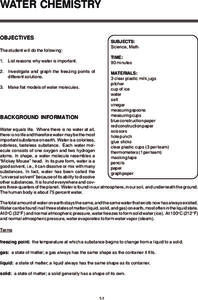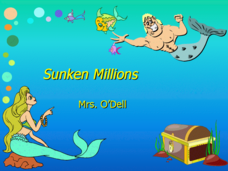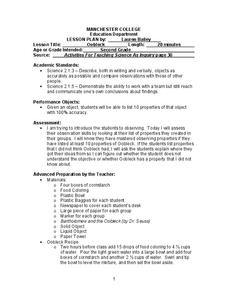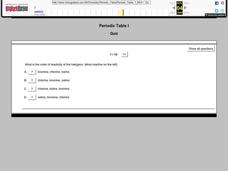Curated OER
States of Matter and Gas Laws
In this matter worksheet, students review the states of matter and the gas law formulas and equations. Students then complete 7 multiple choice questions and 6 problems.
Curated OER
WATER CHEMISTRY
Students list reasons why water is important and investigate and graph the freezing points of different solutions.
Curated OER
As a Matter of Fact!
Students explore matter. They use a formula to measure the volume of matter.
Curated OER
Physical Changes and States of Matter
Fourth graders study evaporation and condensation as parts of the water cycle. First they determine the similarities and differences between a cup of water and an ice cube before measuring the volume of ice before melting it, and...
Curated OER
Changes in Matter
Eighth graders, in groups, explain the difference between physical and chemical changes.
Curated OER
Ice Cream Blizzards
Fourth graders explore whether the making of homemade ice cream is a physical change or a chemical change in a lab experiment. Students identify states of matter, describe the physical properties of states, and collect temperature data...
Curated OER
Exploring Phases of Matter
Students discuss and experiment with the phases of water. In this phases of matter activity, students recognize the different states of matter. Students measure and record changes and understand when the state changes.
Curated OER
Sunken Millions
This PowerPoint provides a game show format with multiple choice questions about fresh and salt water. Topics include sources of water, water geography, uses of water, and the water cycle.
Curated OER
States of Matter
Students explore the states of water. In this physical science lesson, students use ice and dry ice to observe the changes in the state of matter. Students record the results.
Curated OER
What's The Matter?
Fourth graders accurately describe various states of matter, Through experimentation, they change a variable to create a new state of matter. Students record their observations about the way matter is changed and the changes that occur...
Curated OER
How Wet Did It Get?
Students measure the rainfall/snowfall on the playground on a rainy/snowy day with a rain/snow gauge. They draw a bar graph representing the amount of water that fell and observe a satellite image of the clouds and local weather system...
Curated OER
Oobleck
Second graders observe the properties of Oobleck. In this science and observation instructional activity, 2nd graders examine Oobleck and make a list of 10 properties that they notice. They explain their observations.
Curated OER
Water Cycle and Ecosystems
Young scholars explore the water cycle. In this investigative lesson, students examine the water cycle process. They will record their observations and discuss marine and freshwater ecosystems.
Curated OER
Measuring Techniques - Level I
Students, in groups, carry out a recipe and successfully prepare food. After they finish making the product, they compare each group's products and complete "Evaluation of Crunchy Munchy Chocolate-Peanut Goop."
Curated OER
The Water Cycle/States of Matter
Learners engage in a lesson that is concerned with the water cycle and different states of matter. They conduct research using a variety of resources in preparation for taking a quiz. Then students take the quiz in correlation to having...
Curated OER
Chem Word Search Puzzle
In this chemistry terminology worksheet, students review and discuss nineteen terms associated with chemistry and then locate and circle each term in a word search puzzle.
Curated OER
The Water Cycle (Online Interactive Worksheet)
In this water cycle worksheet, students learn about evaporation, condensation and precipitation by reading a text. Students then answer 12 multiple choice questions. This is an online interactive worksheet.
Curated OER
BEAMS Spelling Search
In this science and spelling worksheet, students circle the misspelled word in each of 12 sentences. They write the correct spelling on the blank line at the end of each sentence.
Curated OER
Around and Around (The Water Cycle)
Students view a video of the water cycle, and make a water cycle baggie. In this water cycle lesson plan, students watch a video, discuss vocabulary, and make a water cycle baggie out of water, salt, ice, and a hot plate.
Curated OER
Chlorophyll
Middle schoolers use thin layer chromatography, TLC, to separate various pigments found in plants.
Curated OER
Hot Gas Or Cold Gas Lab
Students engage in a lab project to study chemical reactions. They use guided questions to help facilitate the lab experience and come to the correct outcomes. The lesson does not contain a true understandable objective. The lesson could...
Curated OER
Periodic Table I Quiz
In this periodic table I quiz, students select the best answer to the given questions. Students apply their knowledge of the periodic table and the arrangement to correctly answer the questions presented.
Curated OER
Sound All Around Us
Students make predictions about how sound is formed. They view and discuss a video that explores sound formation and attempt to identify the origin of different sounds.
Curated OER
Properties of Matter: "Sink or Swim"
Third graders recognize that different materials have different properties which can be observed such as texture and bouyancy, and compare and contrast, through observation, ability of some objects to float because of action of...
Other popular searches
- Solids Liquids and Gases
- Solids Liquids Gases
- Solids and Liquids
- Solids, Liquids, Gases
- Solids, Liquids and Gases
- Solids Liquids Gas
- Solids Liquids
- Pictures Solids Liquids Gas
- Solids, Liquids, and Gases
- Solids Liquids and Gas
- Solids Liquids Gases Quiz
- Matter Solids Liquids

























